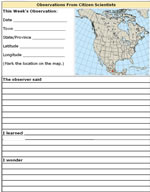Read for details: What facts can you learn about monarch roosts by reading the details people provided? Read these descriptions and find out.
September
2 Story City, Iowa (42 N, -94 W)
We have had monarchs congregate in the fall on the trees on our acerage.
The past two years we have had very few monarchs and also noticed little
to no milkweed growing nearby. This year we have noticed an increase in
milkweed plants and, tonight at 7:10 p.m., noticed many monarch butterflies
flitting about our gardens on our acerage. We shortly discovered the tree
branchs overloaded with monarchs, actually hanging in what seemed like
clusters. One of the bigger monarch groups in recent years. Very exciting!!
>>
August
28 LuVerne, Iowa (43 N, -94 W)
The monarchs have been arriving over several days. I first noticed just
a few on August 28th. I would check every afternoon for more and each
day there would be more up until today September 2nd when there are now
hundreds, all settling in for the night. Awesome! >>
August
31 Caro, Michigan (43 N, -83 W)
We started seeing monarch several years ago and have watched them come
in to roost every year. They come in around 7 pm and fill our trees. They
are usually here for about a week. Some years there are more than others.
This year seems to be off to a good start. Tonight the trees in the front
yard are filling up with monarchs and the branches are heavy with 20 to
30 monarchs on each branch! >>
- You can find all observations reported this week in the sightings database and on the migration maps.
For Your Journal: Each week, choose your favorite monarch sighting and record your thoughts in your journal. >>
|
Monarchs Resting for the Night
"We saw our first small roost of about 30 monarchs
on Friday, August 29. I believe they stuck around for several days
since we have had a strong south wind which would be unfavorable
for their trek south. I just went out to check them again and they
are still here today, September 2. At around noon today the wind
switched from the south to the west and they seemed to be in the
process of moving to a more secluded spot out of the wind."
>> |

